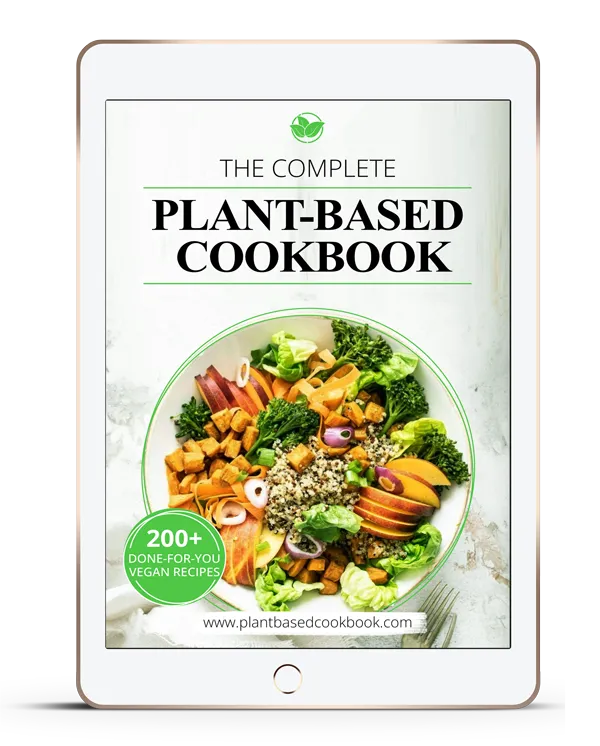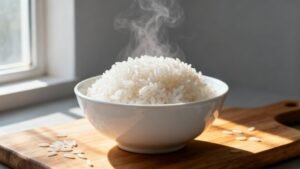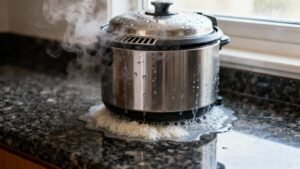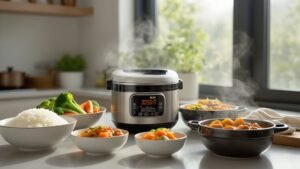You might think that all rice cookers are created equal, but as we will see in this stainless steel vs ceramic rice cooker showdown it’s not as straightforward as you might think.
In this article, we’ll explore the advantages and disadvantages of ceramic and stainless steel rice cookers. From performance to durability and even cleaning, we’ll compare these two popular options side by side. So, if you’re in the market for a new rice cooker, read on to find out which one will suit your needs best.
Table of Contents
ToggleThe Pros and Cons of Ceramic Rice Cookers
If you’re considering a ceramic rice cooker, there are some pros and cons you should be aware of.
On the positive side, ceramic rice cookers are known for their durability and long lifespan. They are resistant to scratches and stains, making them easy to clean and maintain.

Ceramic also retains heat well, allowing for a more even and efficient cooking process. Also, ceramic is a non-toxic material, ensuring that no harmful substances leach into your food.
However, there are some drawbacks to consider.
Ceramic rice cookers tend to be more expensive compared to other materials. They also take longer to heat up and cool down, which may require more time and patience. Furthermore, ceramic can be fragile and prone to cracking if mishandled.
Overall, it’s important to weigh the pros and cons before making a decision.
Stainless Steel Rice Cookers: Advantages and Disadvantages
Now that we’ve looked at ceramic rice cookers, let’s delve into the advantages and disadvantages of stainless steel rice cookers.

Stainless steel rice cookers have several advantages. Firstly, they are highly durable and resistant to scratches and dents, making them long-lasting.
Whats more, they provide efficient heat distribution, ensuring that your rice is evenly cooked.
Because stainless steel also has a non-reactive surface, this means that it won’t affect the taste or quality of the rice, and given thaty, stainless steel is easy to clean and maintain, this makes these cookers a convenient option for busy individuals. However, there are a few disadvantages to consider. Stainless steel rice cookers tend to be more expensive compared to other materials. They also have a tendency to heat up quickly, which can sometimes lead to the rice sticking to the bottom. Despite these drawbacks, stainless steel rice cookers remain a popular choice due to their durability and efficient cooking capabilities.
Performance Comparison: Ceramic Vs Stainless Steel Rice Cookers
When comparing the performance of ceramic and stainless steel rice cookers, you’ll find a notable difference in their cooking abilities.
As we mentioned earlier, ceramic rice cookers are known for their ability to cook rice evenly and thoroughly because ceramic material distributes heat evenly, resulting in perfectly cooked rice with a fluffy texture. It also retains heat well, keeping the rice warm for a longer time.
On the other hand, stainless steel rice cookers heat up quickly and are more efficient in terms of energy consumption. They are also durable and easy to clean. However, stainless steel rice cookers may not cook the rice as evenly as ceramic ones, leading to some grains being undercooked or overcooked.
Overall, the choice between ceramic and stainless steel rice cookers depends on your preference for cooking style and the desired outcome of your rice.
Durability and Longevity: Ceramic Vs Stainless Steel Rice Cookers
To ensure the durability and longevity of your rice cooker, consider the resilience of ceramic and stainless steel models. Both materials have their own advantages and drawbacks when it comes to durability.
- Ceramic: This material is known for its strength and resistance to high temperatures. It is less likely to get scratched or dented, making it a good option for those who want a long-lasting rice cooker. However, ceramic cookers can be more fragile and prone to cracking if mishandled.
- Stainless Steel: Stainless steel is highly durable and resistant to rust and corrosion. It can withstand heavy use and is less likely to break or chip. Additionally, stainless steel cookers are usually dishwasher safe, making them easier to clean and maintain.
Ultimately, the durability and longevity of your rice cooker will depend on how well you take care of it and the quality of the materials used in its construction.
Cleaning and Maintenance: Ceramic Vs Stainless Steel Rice Cookers
To properly maintain and keep your rice cooker clean, it is important to regularly clean and care for both ceramic and stainless steel models.

Cleaning a ceramic rice cooker is relatively easy. After each use, simply remove the inner pot and wash it with warm soapy water. Be sure to also wipe down the exterior of the cooker to remove any food residue. For stainless steel rice cookers, the cleaning process is similar.
However, some models may have a non-stick coating that requires special care. Avoid using abrasive cleaners or scrubbers that could damage the coating. Instead, use a soft sponge or cloth to clean the inner pot and exterior of the cooker. Regular maintenance and cleaning will help prolong the lifespan of your rice cooker and ensure that it continues to cook your rice perfectly every time.
Frequently Asked Questions
Are There Any Health Concerns Associated With Using a Ceramic Rice Cooker?
Using a ceramic rice cooker doesn’t pose any health concerns. It’s a safe and non-toxic option for cooking rice. Enjoy the benefits of ceramic cooking without worrying about any potential health risks.
Which Type of Rice Cooker Is More Energy Efficient?
You want to know which type of rice cooker is more energy efficient. Well, let me tell you, it’s like comparing a sports car to a bicycle. Stainless steel cookers tend to be more efficient than non-metallic ones.
Can Stainless Steel Rice Cookers Be Used to Cook Other Types of Grains Besides Rice?
Yes, stainless steel rice cookers can be used to cook other types of grains besides rice. They provide even heat distribution and maintain the moisture necessary for cooking various grains to perfection.
Are There Any Specific Cooking Techniques or Instructions That Should Be Followed When Using a Ceramic Rice Cooker?
When using a ceramic rice cooker, it is important to follow specific cooking techniques and instructions. This ensures optimal results and prevents any damage to the cooker.
Do Stainless Steel Rice Cookers Have Any Special Features or Settings That Make Them Stand Out From Ceramic Rice Cookers?
Stainless steel rice cookers do have special features and settings that make them stand out from ceramic rice cookers. They often have a variety of cooking modes and advanced functionalities for precise cooking control.
Conclusion
In conclusion, when it comes to choosing between ceramic and stainless steel rice cookers, both have their advantages and disadvantages. Ceramic rice cookers offer even heat distribution and a natural non-stick surface, but they are prone to cracking and require careful handling. On the other hand, stainless steel rice cookers are durable and easy to clean, but may not provide the same level of heat distribution. Ultimately, the choice depends on personal preference and needs. So, whether you’re a rice enthusiast or just looking for a convenient kitchen appliance, the rice cooker showdown offers options that cater to everyone’s taste and requirements.
Last update on 2025-10-09 / Affiliate links / Images from Amazon Product Advertising API






